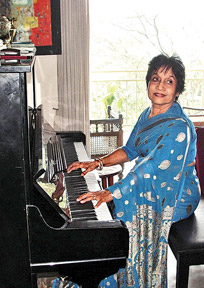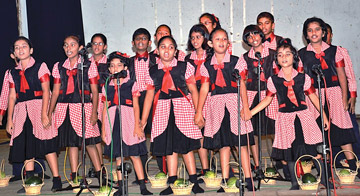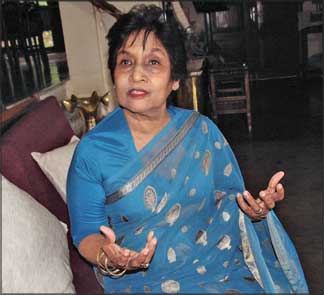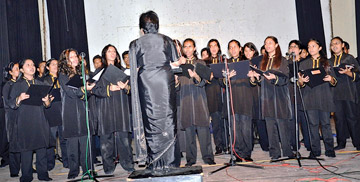|

Bridget and music:
Bonded for life
Ruwini JAYAWARDANA
When her fingers glide gracefully across the keys of the piano, it
plays the song of her heart. A melody which resonates in every human
being, her universal language of music banishes all differences and
becomes a celebration of diversity.
 The artiste, dressed in a turquoise saree, is seated in the living
room of her Anniewatte home, surrounded by a treasure trove of paintings
and artifacts. The artiste, dressed in a turquoise saree, is seated in the living
room of her Anniewatte home, surrounded by a treasure trove of paintings
and artifacts.
“Singing is a means of communication. If you cannot get through to
your audience, there is no point in your effort,” says Bridget Halpe. In
our ‘Encounter of the Week,’ we meet Bridget Halpe, who holds the LRAM
in pianoforte performance of the Royal Academy, London. A well known
choral director, Bridget is devoted to training the Peradeniya Singers,
successors to the University Singers of the University of Ceylon, and
the Kandy Junior Singers. She also trains choirs at schools and arranges
concerts in aid of charity.
Bridget was recently awarded the Iconic Personality award for her
excellence in vocational service by the Kandy Rotary Club. She also
turned 75 this year and has been dedicated to music teaching for over 50
years.
Q: Is choral music as recognised as other music genres in the
society today?
A: In Sri Lanka, choral music has a very important and popular
place in terms of musical genres. This is mainly because most schools
have several choirs. We also have professional choirs like Voice Print,
Soul Sounds, Revelations or the Peradeniya Singers.
There is a lot of opportunity for students to be exposed to choral
singing because the schools hold competitions and festivals. The
professional choirs also perform their particular concerts throughout
the year.
Because of this, choral music has a head start over other genres like
chamber music, instrumental music or orchestral music. It is very
difficult to organise these other musical activities and concerts
because it requires people to dedicate at least eight hours a day to the
profession. But at school, it is part of the timetable.
Choral singing also involves the use of the primordial instrument,
your voice. I feel that the voice gives you the satisfaction of
possessing the instrument that you carry with you. You have the thrill
of singing and listening to the many voices that blend simultaneously,
harmoniously, in choral music.
Q: Why is choral directing such a demanding art?
A: It is a difficult profession in our country. If you visit a
country away from Sri Lanka, you often get people who have had a
tradition of singing in school right from the very beginning. Here in
Sri Lanka, the student has to depend on people like me to give them the
shape of the music and an idea of the history of musical experience.
I have a Poya listening class where I ask anyone to come home and
listen to music. Listening is the vital aspect in music. The more you
listen, the more you learn. Our children haven’t got the opportunity to
own quality Classical CDs. Sadly very few make use of the Poya listening
sessions. I started this activity mainly to renew my sense of listening.
I have presented hundreds of concerts during my lifetime. There is a
minimum of two concerts that I present per year: the mid-year concert
and the Christmas concert. These are mostly comprised of Classical
music. I teach at Girls’ High School, Kandy, and help out any school
that asks my help to teach their choirs, provided I can find the time
for them.
Q: How did the Kandy Music Society, the Peradeniya Singers and
Kandy Junior Singers come to be?
A: The Kandy Music Society is the only active music society in
the country. It was started by colonial citizens but it faded away in
the 1930s. Prof Valentine Basnayake, Prof Gerald Cooray, my husband Prof
Ashley Halpe, myself, and a few others decided to revive the society
from 1990. It has since gone on from strength to strength.
 |
|
Kandy
Junior Singers lead the tunes |
Each month, apart from our committee meetings, we have a presentation
of a concert. It may be a house concert or a free concert from
orgnizations like Sewalanka Foundation or the Norwegian Concerts
organization. A lot of foreign artists present their performances for
free. Professionals like Ravibandu Vidyapathi have performed for us.
Austrian concert pianist Albert Sassmann has visited. Likewise, opera
singers like tenore robusto Jan-Ate Stobbe, are some of the many who
have taken part in our events. All this from a voluntary organization.
The Peradeniya Singers were originally called the University Singers
of the University of Ceylon. They began in 1953. Robin Mayhead was the
director and my husband was a founder member. Mayhead had a love for a
capella (unaccompanied) singing. I entered the scene in 1956.
The performances were very limited because Robin was about to leave
the country and there was no one to take over. I too went to UK with
Ashley but on my return in 1962, I took over the group.
We should attract young adults from universities who would be
interested in this culture of getting together to sing. But I am sad to
find that the rat race of examinations has eclipsed this possibility. I
realised that the university students here were not that interested in
this type of choral singing. Once the university involvement became less
I renamed the group the “Peradeniya Singers.”
The Kandy Junior Singers is my concept for little children between
five and fifteen. Both are choral groups but, of course, I also teach
solo playing, chamber music, voice training etc. I love and live music!
Q: You use your musical talents as a means of aiding charity.
A: I believe that every artiste has a responsibility to the
community. God has given us a talent but if you do not make use of it to
serve the community there is no point in your god-given gift.
All my concerts have been for charity. My latest one was for a group
which has been forgotten by the society, retired, disabled music
teachers. They have done a wonderful service to humanity and the moment
they age, they are pushed aside. I have started funding for them but the
funds are limited so I am only able to help out one teacher in Galle for
the moment.
Q: You have also introduced the use of traditional Sri Lankan
songs in the section in the singing examination syllabus which requires
a traditional song.
A: I teach for the Royal Schools of Music and the Trinity
College of Music. Examinations are like a milestone and the child has to
learn to enjoy the experience while we as teachers need to look at the
examination as a two way process, as giving and taking. We need to take
the expertise of the examiner but we also have to give them something of
our culture.
 |
|
Bridget
Halpe. Picture by Gamini Ranasinghe |
Much of the subject syllabi are anglocentric. The examining bodies do
not know the richness of our folk traditions. Recently, this has shifted
and there has been a renewed interest in indigenous and folk music. I
notate the music of the Sinhala folk songs and translate the lyrics. The
challenge is in blending the rhythms and sounds which work so well in
Sinhala, into English. I give the English translation and notations to
the examiner and it is a joy to see that they love our music.
Q: Why did you decide to do research on the 48 Preludes and
Fugues of J S Bach?
A: That is, hopefully, my magnum opus. I was fired up by the
sheer genius of the composer. The music is so complex and challenging.
You have to select your fingers carefully in order to bring out the
threads and weaves of the music. It is a time-consuming task. It is the
high point of Baroque music for keyboard players. Bach wrote two sets of
Preludes and Fugues in every tonality – major and minor.
Bach worked on the clavichord and he decided to equalize the
temperament, or the tuning system, of the instruments. In the old system
of tuning they used the natural interval called the Wolf Fifth. That did
not allow you to come back from one tonal centre through the twelve
in-between, to the other tonal centre. Bach reduced some of the
vibrations of the Wolf Fifth and equalized the distance in every major
and minor key. To prove that it can be done, he wrote the 48 Preludes
and Fugues.
Q: In your opinion who is the greatest composer in history?
A: I do not believe that there is a thing called ‘the greatest
composer’ because you may like one composer more than another, but they
are all great. They all engage in deep thinking to bring out their
creations which have inspired many. My favourite composer is Mozart but
I wouldn’t deny the importance of people like Chopin or some of the
contemporary composers.
People play pieces by past composers but few know the masterminds
behind the works in the contemporary idiom. Every tradition borrows
something, enhances it and gives it to another tradition to develop.
Lots of people do not like contemporary music because it can sometimes
be difficult and harsh, but if we are living in harsh surroundings why
shouldn’t music depict that quality?
Q: What kind of impact did working with Prof Sarachchandra on
his play ‘Pemato Jayati Soko’ have on your musical career?
 |
|
Peradeniya
Singers in performance |
A: I was thrilled to do counterpoint for the play. The
original melodies had been done in ragadari music by Jayantha Aravinda.
I was to make a new dimension of harmony which begins with counterpoint
which literally means “note against note.” This is a second level of
music to match Jayantha’s ragadari music.
I worked with Jayantha and he taught me the ascending and descending
modes. I tried to pick those tonalities from the ragas. Though Prof
Sarachandra loved the composition it was very difficult to execute it
because the orchestra was not used to reading scores.
They were at home with the free tonality of ragas which they could
improvise on. They objected to my music, thinking that I was too
western-oriented. However Dhamma Jagoda was thrilled with my work. Some
of the members of the orchestra like Dr Weerakkody responded well to my
music because they were familiar with the eastern and western
traditions.
I try to bring in a degree of fusion into my compositions. We need to
get the best of every tradition since they all have their plus points.
We will be able to enrich our tradition in this manner.
Q: You have more than 50 years of experience as a music
teacher. How would you describe your experience?
A: Every milestone has been a rewarding and thrilling
experience. It is as if God has pointed out the path, or the journey, to
me. I have not regretted or turned back. I have enjoyed every moment of
the experience.
Q: What are your plans for the future?
A: I am organising a concert for the 60th anniversary of the
University of Ceylon.
There is a project with the Alliance Francaise with world famous
violinist Frederic Pelassy who's due in Sri Lanka.
There will also be the choral festival, choral competition in Colombo
and the Shakespeare Drama Competition all coming up in 2012.
|



